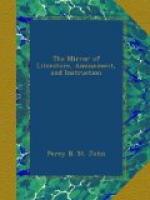EDWARD I.
began his reign 16th Nov. 1272, ended 7th July, 1307.
Popes.
Gregory X., 1270.
Innocent V., 1276.
Adrian V., 1276.
John XXI., 1276.
Nicholas III., 1277.
Martin IV., 1281.
Honorius IV., 1285.
Nicholas IV., 1288.
Celestin V., 1294.
Boniface VIII., 1294.
Benedict X., 1303.
Clement V., 1305.
Emperors of the East.
Michael VIII., 1259.
Andronicus II., 1283.
Emperors of the West.
Frederic II., 1212.
Rodolphus I., 1273.
Adolphus, 1291.
Albert I., 1298.
France.
Philip III., 1270.
Philip IV., 1285.
Scotland.
Alexander III., 1249.
John Baliol, 1293.
Robert Bruce, 1306.
(To be continued.)
* * * * *
THE GATHERER.
A snapper up of unconsidered trifles.
SHAKSPEARE.
* * * * *
TIMELY REPARTEE.
A soldier of Marshal Saxe’s army being discovered in a theft, was condemned to be hanged. What he had stolen might be worth about 5s. The marshal meeting him as he was being led to execution, said to him, “What a miserable fool you were to risk your life for 5s.!”—“General,” replied the soldier, “I have risked it every day for five-pence.” This repartee saved his life.
* * * * *
MARSHAL VILLARS.
It was customary, as the French general in command of the Italian army passed through Lyons to join his army, for that town to offer him a purse full of gold. Marshal Villars on being thus complimented by the head magistrate, the latter concluded his speech by observing, that Turenne, who was the last commander of the Italian army who had honoured the town with his presence, had taken the purse, but returned the money. “Ah!” replied Villars, pocketing both the purse and the gold, “I have always looked upon Turenne to be inimitable.”
* * * * *
LONG STORIES.
Capt. S------, of the ------ regiment, during the American war, was notorious for a propensity, not to story-telling, but to telling long stories, which he used to indulge in defiance of time and place, often to the great annoyance of his immediate companions; but he was so good-humoured withal, that they were loth to check him abruptly or harshly. An opportunity occurred of giving him a hint, which had the desired effect. He was a member of a courtmartial assembled for the trial of a private of the regiment. The man bore a very good character in general, the offence he had committed was slight, and the court was rather at a loss what punishment to award, for it was requisite to award some, as the man had been found guilty. While they were deliberating on this, Major ------, now General Sir ------, suddenly turning to the president, said, in his dry manner, “Suppose we sentence him to hear two of Captain S------’s long stories.”
* * * * *




